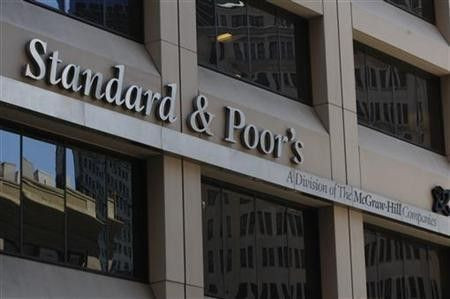S&P Downgrade: How does it affect McGraw-Hill?

The amount of negative attention Standard & Poor's has received since its decision to downgrade U.S. long-term debt would make it seem like the rating agency is Public Enemy No. 1.
The Treasury Department immediately pushed back, asserting S&P made a $2 trillion mistake in arriving to its downgrade decision. Secretary Timothy Geithner declared that the downgrade showed a "stunning lack of knowledge about basic U.S. fiscal budget math."
As the United States and investors, such as Berkshire Hathaway's Warren Buffet, decry S&P's decision, it raises a question over how this downgrade might affect its parent company, McGraw-Hill Companies Inc.
In addition to owning Standard & Poor's, McGraw-Hill is most known for being the largest educational publishing company. It largely stays out of the public spotlight while doing its business, but now has been dragged into public discourse over its subsidiary's landmark decision.
McGraw-Hill has seen its stock drop more than 10 percent since S&P's announcement.
But will the downgrade actually have a major impact on McGraw-Hill into the future?
Edward Atorino, a media analyst for The Benchmark Company, doesn't think so.
Although investors could be upset at S&P and thus push McGraw-Hill down, Atorino doesn't see that as a likely scenario.
The only way that Atorino thinks that McGraw-Hill and S&P could take a big hit is if the government decides to intervene. But even a government intervention is unlikely, as the possible media backlash could be strong.
"Mr. Obama could call up the head of the SEC and say get those bastards (at S&P) but I'd imagine that would leak out," Atorino said. "I don't know what they could do; it seems that the government has no recourse.
"It can't regulate S&P."
Swift Reaction Against S&P
Investors and politicians alike responded swiftly to S&P's downgrade announcement - often quite negatively.
In addition to Geithner's rebuttal, investors such as Legg Mason Capital's Bill Miller came out strongly.
In a note to clients, Miller said the S&P decision was "wrong and dangerous" and showed a "stunning ignorance and complete disregard for the potential consequences of its actions on a fragile global financial system."
Buffet stated that the downgrade could lower his opinion of S&P, but he was still confident that long-term U.S. debt was AAA-worthy.
"Our currency is not AAA, and in recent months the performance of our government has not been AAA, but our debt is AAA," Buffett told CNBC.
"You did have the tiny error of $2 trillion," billionaire investor Wilbur Ross also told CNBC. "It's almost as though they had made their mind up independently of the math."
S&P Used as Political Weapon
David Beers, global head of sovereign ratings for Standard & Poor's, lighted a flame in the political atmosphere when he told television networks that a major reason for the downgrade was political uncertainty within the United States.
"The nature of the debate and the difficulty in framing a political consensus ... that was the key consideration," Beers said in an interview over the weekend.
That statement was all Washington politicians needed to start blaming one another for the downgrade.
Senator John Kerry (D-Mass.) and former White House adviser David Axelrod both referred to it as a "Tea Party downgrade."
Republican presidential candidates, such as Minnesotans Tim Pawlenty and Michele Bachmann, both used it as a means to attack President Barack Obama.
Bachmann called on the president to ask for Geithner's resignation and said Obama was "destroying the foundations of the U.S. economy one beam at a time."
Pawlenty criticized Obama for attempting to take things out of the private sector and put them into the government.
S&P to Face Heat from U.S. Government?
An earlier Associated Press story reported that the Senate Banking Committee was gathering information on S&P's decision and could ultimately hold a hearing on the downgrade.
Analysts such as Atorino think that calling S&P in front of a government agency or congressional committee wouldn't be the best course of action. S&P has already publicly backed up its assessment on television, radio, print and more, and is unlikely to reconsider at this point, according to Atorino.
Moreover, S&P is an independent rating service and doesn't have to answer to what the United States wants. Atorino likened it to Chrysler getting poorly rated and wanting another review.
One thing the government could do is reopen investigations of credit rating agencies, though that could also have its drawbacks.
"Only recourse they have is to secretly tell SEC to reopen credit agencies," Atorino said. "I presume the media would not like that, though, and that would be an embarrassment for the Obama administration."
S&P "didn't do anything illegal or unethical," he said. "It did what it is supposed to do."
© Copyright IBTimes 2025. All rights reserved.





















